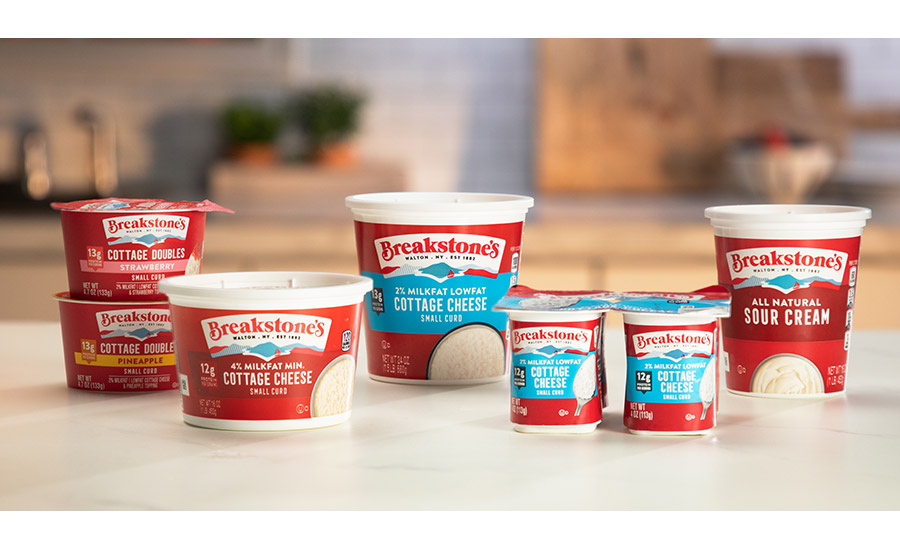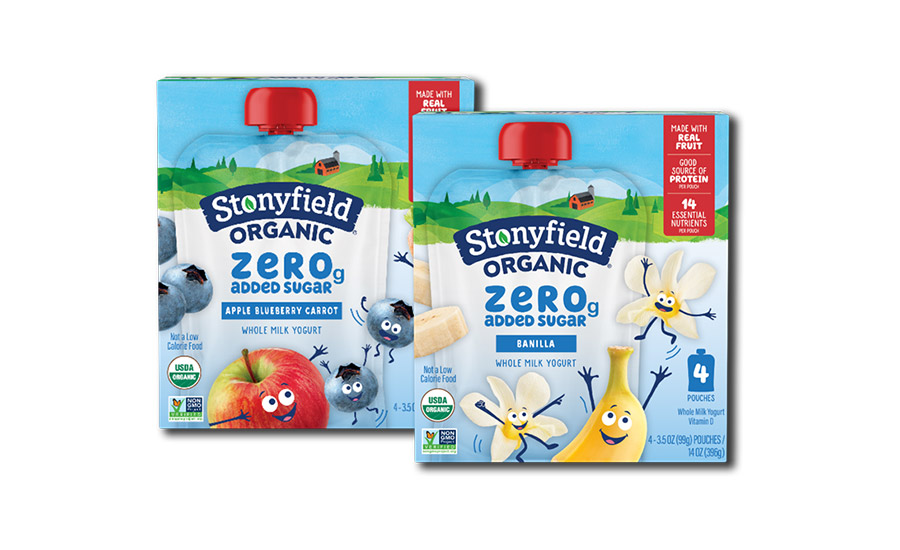2024 State of the Dairy Industry: Cultured Dairy
Cultured dairy eclipses dairy industry with protein-packed nutrition: Yogurt, cottage cheese drive sales due to health and wellness benefits.

Credit: ollo / iStock / Getty Images Plus

On April 8, something miraculous occurred in the United States that only happens every 18-plus years — a total solar eclipse. St. Louis, Southern Illinois and Waco, Texas, were among the prime viewing locations for the path of totality. For four minutes, the sky was completely darkened in the middle of the day, with people all over the United States viewing this once-in-every 16,585.32 days (Saros Cycle) event.
The magnanimous cultured dairy category — comprising such diverse segments as cottage cheese, yogurt, drinkable yogurt, kefir, sour cream, cream cheese and refrigerated dips — is like a clear-blue summer sky with resurging, in some cases, double-digit growth that is “eclipsing” much of the dairy industry. The fact that many cultured dairy products also are packed with protein, probiotics and portability only adds to its wide-ranging appeal.
John Crawford, senior vice president for Client Insights-Dairy at Chicago-based market research firm Circana, points out the “strong growth” by Chobani, Danone and private-label brands which are developing diverse flavors and empowering functionality for yogurt, Greek yogurt and ready-to-drink (RTD) yogurts.
He explains, “Yogurt has seen a resurgence of +6.5% in dollar sales and +5.4% in volume. Spoonable Yogurt is up +6.4% and +5.5%, while Yogurt Drinks is seeing dollar sales and volume growth of +7.2% and +4.6%, respectively.”
Between 2018-2023, yogurt, including Greek-style yogurt, other yogurt, drinkable yogurt, and squeezable yogurt, generated revenue of $8.2 billion with a compound annual growth rate (CAGR) of 1% and a gray-sky inducing 0.5% CAGR predicted from 2023-2028, according to IBISWorld’s September 2023 report, “Yogurt Production in the US.”
“Operators have been able to shift alongside consumer demand, marketing low-fat products such as Greek yogurt to keep up with dietary trends, despite a decline in the healthy eating index over the past five years,” the report stated. “… Overall revenue is forecast to grow at a CAGR of 0.5% to $8.4 billion over the five years to 2028. Despite increasing revenue, profit is anticipated to remain stagnant as price competition increases. Still, new entrants are expected to capitalize on rising demand, increasing the number of operators.”
The report added that the arrival of Greek-style yogurt, spurred on by the introduction of New Berlin, N.Y.-based Chobani LLC in 2005, increased demand for Greek yogurt at an “astronomical rate.” The thicker, creamier, and healthier indulgent Greek yogurt accounted for one half of revenue in 2023 since the more premium product costs double the amount of other yogurt products.
This month, Chobani released a new line of functional cultured dairy products to address consumer demand for more protein in their everyday routines and diet. Chobani High Protein, a line of high-protein Greek yogurt cups and drinks, is made with only natural ingredients, real fruit, and zero grams of added sugar, the company says.

Available in Vanilla, Strawberry Kiwi, Mango, Raspberry Lemon, and Cherry Berry, the 20G Protein Greek Yogurt is available in 6.7-ounce cups for a suggested retail price of $1.99. Additionally, the company will introduce several protein-infused drinks in 7-, 10- and 14-ounce RTD bottles with 15, 20, and, for the first time, 30 grams of protein in each serving — all lactose-free and with no added protein powders, concentrates or preservatives. These high-protein drinks will be available at retailers nationwide in January.
A certified B Corporation, Stonyfield Organic, co-founded by Samuel Kaymen and Gary Hirshberg in 1983, has been producing organic whole milk and lowfat Greek yogurt, yogurt and smoothies in pouches, cups and tubes for 40 years.
With several products developed for babies and kids, the Londonderry, N.H.-based company uses real fruit and vegetables in its products. The brand recently released new Kids ZEROg Sugar Added yogurt pouches, the only Kids’ dairy yogurt pouch that has zero grams of added sugar, the company says.
The organic ZEROg Added Sugar yogurt pouches come in delicious flavors like Blueberry Apple Carrot and Banilla (Banana and Vanilla) and are available nationwide for a suggested retail price of $1.99 for a single serving and $6.99 for a 4-count pack.
Protein and probiotics, please
Recent studies from market research firms Mitel and Nielsen show that more than half of consumers are looking to increase their intake of protein and that they are prioritizing low sugar and high protein in their diets.
“Not only is yogurt a higher-quality source of protein than alternatives like soy and peanut butter, it is also more accessible and portable than other animal sources like beef and chicken,” stated a FAO Protein quality evaluation.
Miri Eliyahu, a consultant researcher at Euromonitor International, a Chicago-based market research firm, concurs the continual rise of protein sweeping through dairy products in 2024 is a top trending consumer demand from packaged foods in general, and dairy products and alternatives in particular.

“This had led to a significant boost in value and volumes for cottage cheese, a niche product that is now gaining popularity among U.S. consumers due to its high protein, gut-friendly characteristics,” she says. “… Protein serves not just as a macro nutrient that is in demand, but also as a key factor in creating long-term satiety among consumers, which again, leads American consumers to choose it every time when faced with a choice.”
Chicago-based SPINS notes the disruption landscape of probiotics and its expansion in more foods beyond yogurt and RTD yogurt, which exhibited 7% YoY growth. Additionally, probiotic usage in milk, cottage cheese, sour cream, and more is up 54%, according to an infographic shared by SPINS.
“As consumers begin to learn more about the microbiome and its impact on overall health, they are looking for more ways to incorporate biotics into their diets — and dairy brands have noticed,” the infographic revealed.
Interestingly, social media, particularly TikTok influencers, has led to heightened interest in cottage cheese, which is up nearly 16% in dollar sales and 13% in volume, Crawford notes.
“Cottage Cheese continues to be a top growing category in the entire store. It is a strong example of the power of social media and finding new use occasions for a product (category in this case),” he says. “Within Cultured, Cream Cheese is up +1.5 for dollars and +0.4% for volume, Sour Cream rose +2.9% and +1.2%, while Refrigerated Dips saw identical growth of +5.1% for dollars and volume.”
Many cultured dairy ingredients are used in recipes and are go-to appetizers for Game Day snacking in such favorites as Hormel Chili Cheese Dip, Spinach and Onion Dip, Pepperoni Pickle Bites and Mexican Pizza.

Breakstone’s, manufacturers of cottage cheese, ricotta, and sour cream, partnered with Dash to offer easy egg bite recipes that can be made in less than 10 minutes. Featuring Breakstone’s 2% lowfat cottage cheese and the Dash Egg Bite Maker, busy families can start their day with a delicious and convenient breakfast option.
Breakstone’s 2% lowfat cottage cheese provides 13 grams of protein and 10% of the daily recommended value of calcium per serving. Lactalis Heritage Dairy points out that its cottage cheese is creamy, which helps create egg bites (with 6g of protein) that are soft and fluffy and can be made with all kinds of different fillings such as Breakstone’s Bacon and Egg Cups recipe, or the vegetarian Red Pepper and Spinach recipe.
The landscape of dairy
Although cultured dairy products will continue to be in demand, Euromonitor International’s Eliyahu suggests that inflation, unit prices and price sensitivity will remain major contributing factors for the landscape of dairy.
“As long as wages fall short of inflation and price increases overall, there will be a struggle to maintain and grow volumes and most dairy categories. However, some dairy products are seeing significant growth such as fromage and cottage cheese due to its nutritional content, something American consumers are now seeking more and more of,” she says.
“All dairy categories that are growing are doing so despite unit price growth and not because of it, by providing some sort of health and wellness benefit such as pro and prebiotic qualities in yogurts and some soft cheeses,” she continues. “To counter the higher costs for consumers, a great strategy is premiumization of the products to attract consumers even at a higher price point.”
Additionally, clean-label claims, organic, reduced or no sugar, and functional benefits will continue to influence consumers buying decisions.
“Within Dairy, No Added Sweetener +14.2%, Natural Sweetener +11.4%, Protein +10.4%, Low Sugar +9.9%, Pre/Probiotic +8.9% and Lactose-Free +5.9% are top growing claims in dollars,” Circana’s Crawford says.
These value-added attributes and the health and wellness benefits cultured dairy delivers makes them ripe for continued innovation and future success, according to Crawford and Eliyahu.
Crawford concludes, “Value-added dairy products are on trend and can win. Products that offer digestive health, protein, low sugar, lactose-free, and ultra-pasteurized (extended shelf life) are all potential winning positions for dairy.”
Looking for a reprint of this article?
From high-res PDFs to custom plaques, order your copy today!






